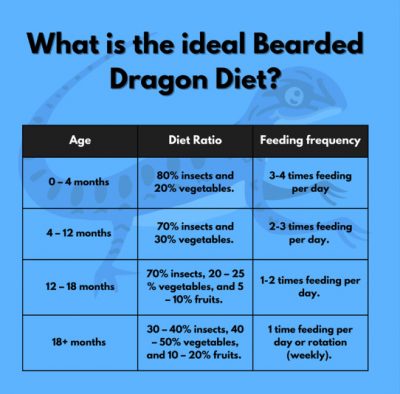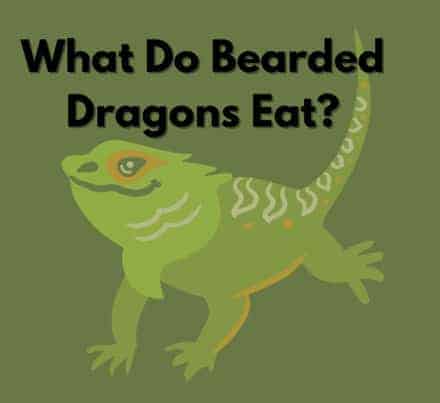What Do Bearded Dragons Eat
Bearded dragons are omnivores and can eat a variety of foods, including fruits, vegetables, and insects.
Depending on the bearded dragon’s age, the amount of the ingredients and nutrients in the diet may vary.
Contents
2 The ideal Bearded Dragon Diet
4 What vegetables do bearded dragons eat?
5 What fruits can bearded dragons eat?
6 How often do bearded dragons eat?
7 What do baby bearded Dragons Eat?
8 What should you never feed your beardie?
9 Foods you should NEVER feed your bearded dragon:
10 What about vitamins and minerals?
12 New Pet Owner Summary: What to feed your Bearded Dragon
The ideal Bearded Dragon Diet
 What do Bearded Dragons Eat?
What do Bearded Dragons Eat?
Bearded dragons require a suitable diet of animal protein to aid in their development and cellular metabolism. 80% insects and 20% green vegetables should make up the diet of a 4-month-old bearded dragon, which should be fed three times per day. For their development to be strong and healthy, young, bearded dragons at this stage require protein. Due to their rapid growth at this age, it is extremely important that you consult a veterinarian right away if your young, bearded dragon isn’t feeding frequently.
Because they go through a process called bromination in the winter that reduces their activity level, adult bearded dragons can survive up to two months without feeding. However, a young, bearded dragon has to feed three times per day.
Adult bearded dragons should consume 30 to 40% insects, 40 to 50% vegetables, and 10 to 20% fruits as part of their diet. Dietary components like protein, fiber, vitamins, and minerals should address the bearded dragon’s bodily needs. It’s important to understand the nutritional content of fruits before feeding them to pets. High phosphorus can inhibit calcium absorption and lead to metabolic bone disease in bearded dragons, hence the fruit should have high calcium and low phosphorus content.
| Age | Diet ratio | Feeding frequency |
| 0 – 4 months | 80% insects and 20% vegetables. | 3-4 times feeding per day |
| 4 – 12 months | 70% insects and 30% vegetables. | 2-3 times feeding per day. |
| 12 – 18 months | 70% insects, 20 – 25 % vegetables, and 5 – 10% fruits. | 1-2 times feeding per day. |
| 18+ months | 30 – 40% insects, 40 – 50% vegetables, and 10 – 20% fruits. | 1 time feeding per day or rotation (weekly). |

Adult bearded dragons should consume 30 to 40% insects, 40 to 50% vegetables, and 10 to 20% fruits as part of their diet.
Dr. Dilber HussainBugs to avoid
As a source of protein and numerous other nutrients, insects, and bugs are a favorite food of bearded dragons. However, bearded dragons cannot safely consume all insects and bugs as some may be toxic. When bearded dragon consumes poisonous bugs, they secrete toxins, which can be lethal. One of the insects that bearded dragons should stay away from is lightning bugs.
Bearded dragons can die from exposure to lighting bugs because they contain a poison called lucibufagins, which is poisonous to the bearded dragons’ cardiac muscles. The following are some bugs that bearded dragons shouldn’t eat:
- Fireflies
- Butterflies
- Ladybugs
- Box elder bugs
- Wild caught bugs
- Caterpillars
- Venomous insects
- Wild tomato hornworms
What vegetables do bearded dragons eat?
Bearded dragons can and should have healthy vegetables within their diet to keep their digestive systems active and healthy. However, some veggies have excessive amounts of fiber and water, both of which can be harmful when heavily consumed. The key is choosing the right type of vegetables that can promote correct digestive health without negatively impacting Below is a list of healthy vegetables that bearded dragons can consume.
Vegetables bearded dragons can eat:
- Carrots
- Cabbage
- Collard greens
- Kale
- Dandelion greens
- Broccoli
- Beet greens
- Alfalfa hay
- Kale
- Parsley
- Pumpkins
- Yellow squash
- Mustard greens
- Bell peppers
- Yams
- Asparagus
- Acorn squash
- Parsnip
- Watercress
- Savory
- Green beans
What fruits can bearded dragons eat?
Fruits make meals more palatable and provide bearded dragons access to minerals. Fruits should, however, be offered as treats or should make up 10% to 20% of an adult bearded dragon’s diet. They include sugar, which when levels become too high, can harm bearded dragons’ health.
It is important to consider the calcium-phosphorus ratio when choosing fruits.
The ideal calcium-phosphorus ratio for bearded dragons is 2:1 or 1:1. Because phosphorus prevents calcium from being absorbed from the intestine and causes calcium deficiency in bearded dragons.
The following fruits are good for bearded dragons to eat.
- Apricots
- Berries
- Apples
- Cherries
- Grapes
- Mangoes
- Figs
- Dates
- Pears
- Watermelon
- Peaches
- Pineapple
Can Bearded Dragons Eat Grapes?
How often do bearded dragons eat?
The frequency of feeding is crucial for young, bearded dragons. They need nutrients, vitamins, and minerals to ensure healthy growth when they are in the growing stage. The bearded dragon’s growth might be slowed down by an improper food and feeding schedule.
Feeding times by age:
- 0 – 4 months: fed 3-4 times per day
- 4 – 12 months: fed 2-3 times per day
- 12 – 18 months: fed 1 – 2 times per day
- 18+ months: fed 1 time per day
What do baby bearded Dragons Eat?
Baby bearded dragons require a sufficient amount of protein to promote the healthy growth of muscles and tissues. Insects should make up 70–80% of a young bearded dragon’s diet, with vegetables making up 20–30%. Baby beardies’ healthy growth is maintained when a protein supply and greens are combined in the right proportion.
A baby bearded dragon needs to be fed insects three times per day. Calcium, vitamins, and minerals are also present in insects and vegetables as young beardies are more prone to calcium deficiency and metabolic bone disease. Therefore, the right calcium source aids in the prevention of skeletal disorders and abnormal bone growth.
Insects should make up 70-80% of a young bearded dragon’s diet
Dr. Dilber HussainWhat should you never feed your beardie?
You should always check the calcium-phosphorus ratio, oxalates, sugar, fiber, and water content of any food you give a bearded dragon. Bearded dragons’ bones can be damaged by foods that are high in phosphorus and lack calcium. Oxalates-containing vegetables and greens are also harmful to bearded dragons.
In the body of the bearded dragon, oxalates react with calcium to form calcium oxalate, which blocks calcium absorption. Foods with excessive amounts of fiber and water are also detrimental to bearded dragon health. Constipation, diarrhea, and digestive upset can result from consuming too much fiber and water.
Foods you should NEVER feed your bearded dragon:
- Onions
- Mushrooms
- Leeks
- Garlic
- Rhubarb
- Avocados
- Wild caught insects
- Fireflies
- Citrus fruits
- Beet tops
- Spinach
What about vitamins and minerals?
Bearded dragons’ bodies do not produce the essential vitamins and minerals and could be supplemented. These micronutrients are crucial for supporting healthy body functions. The skeletal system and bone formation depend on calcium and vitamin D3. Vitamin C strengthens the bearded dragon’s immune system and aids in the defense against foreign pathogens.
How much water?
Bearded dragons obtain water through their skin, food, and direct drinking. An adult bearded dragon requires 5 to 10 ml of water each day. Water is essential to keep bearded dragons healthy and hydrated. Dehydration can impair the body’s metabolic reactions as well as the skin and digestive systems.
New Pet Owner Summary: What to feed your Bearded Dragon
- Bearded dragons are omnivores and can consume insects, vegetables, and a small amount of fruit
- Their diet will change with age
- Young bearded dragons need more insects & protein; fully-grown bearded dragons require more vegetables
- Not all insects are safe – fireflies & wild-caught insects should be avoided
- How long do bearded dragons live?
AIW Veterinary Council is a group of certified veterinarians or animal health professionals. We strive to publish information with diverse opinions and multiple citations. All content through the AIW Veterinary Council is either written or reviewed by professionals including but not limited to the people below. Dr. Dilber Hussain is a veterinarian, who studied veterinary medicine at the Sindh Agriculture University Tandojam. After completing the degree, he worked as a veterinary surgeon in different vet surgeries and clinics in Pakistan. He is also working for Animal Welfare and Animal Rights in Pakistan. Besides this, he is giving lectures, some of them at the University of animal sciences, Lahore, and publishing articles about pet health, nutrition, diseases, and animal welfare issues. As an expert and animal rights activist, he often has to be at a court of justice to support lawsuits regarding animal welfare.
Latest posts by AIW Veterinary Council (see all)
- Can Rabbits Eat Watermelon? - November 3, 2022
- What Do Bearded Dragons Eat? - November 2, 2022
- Can Bearded Dragons Eat Grapes? - October 5, 2022